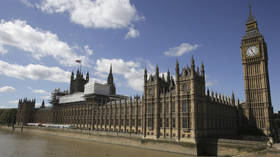At least Trump is honest: Let ‘adversaries’ fight Islamic State while US steals the spoils
Few US presidents have brazenly confessed the underlying motives of American foreign policy like Donald Trump has. But are we getting the full picture, and what’s missing from Donald Trump’s confessions?
US President Donald Trump did the unthinkable and admitted some much-needed truth about US foreign policy. By declaring that it is time for the US to pass the fight against the terror group Islamic State (IS, formerly ISIS/ISIL) over to Russia, Iran, Iraq, and Syria, while suggesting that the US should instead focus on maintaining control of oil resources in the region, he willingly shone a whole new light on the true motives of the powers-that-be in the Middle East region.
Most notable is his willingness to pass control of the war against IS onto one of his prime arch enemies: Iran. Stating that “Iran hates ISIS and they should do it” is probably the most surprising statement to ever leave Donald Trump’s mouth, and that’s really saying something.
Scoring points at home
However, despite a recent spike in headlines questioning and opposing US-led ‘forever wars’, one can’t help but notice that the mainstream media is eerily quiet when US President Donald Trump effectively makes statements that indicate he will bring about an end to some of these never-ending conflicts.
Also on rt.com Iran is winning strategic struggle for influence, even as US cripples its economyAnd perhaps this is really what’s at stake here. Trump has made these statements at a time when the ongoing Democratic primary debates have barely mentioned ongoing wars in Afghanistan, Iraq, Syria, and Yemen. He knows he can sway some disillusioned voters his way with his bold rhetoric surrounding ending US wars in the Middle East and a greater focus on making America “great again.” In this sense, making America great again means making America as rich as possible – by capitalizing on the resources of afflicted nations in the Middle East.
At least he’s honest about stating a long-held US foreign policy objective of securing the control of a country’s resources while allowing rebel groups and governments to do some terribly dirty work on its behalf.
Cleaning up America’s mess
That being said, his statement that “Iran hates ISIS and they should do it” does contradict his own military actions. Contrary to what the mainstream media often says, it is the Syrian government and its allies (including and especially Iran) who have been the most heavily engaged entity battling IS. In other words, Trump’s statement is entirely correct. However, it is not helpful for the battle against IS when Trump personally ordered the assassination of one of IS’s most prime enemies, Iranian general Qasem Soleimani (an act which saw much jubilation from IS leadership).
The question needs to be asked: how did the war against IS become a US-led war anyway? IS declared a self-made caliphate in Iraq and Syria, thousands of miles away from the US mainland. The terror group – allegedly financed by American allies – only exists because the US toppled Iraq’s leadership in 2003 and left an enormous vacuum of power in its wake. While putting up its hand to “degrade” and ultimately “destroy” the terror network, the US instead left huge amounts of destruction in its wake, razing most of Mosul and Raqqa to the ground.
Seeing as the world likes assessing calamities via their monetary cost as opposed to their mortality cost, it’s worth explaining that the annual cost of rebuilding Mosul alone is $1.8 billion. It must be a slap in the face for the Iraqi people who fought and died to rid themselves of the threat of IS to later learn that the commander-in-chief of the entire operation was only interested in their country’s oil supply.
Also on rt.com US targeting of Nigeria: Is it really about terrorist problem or is America fearful of Africa’s first superpower emerging?It’s all about Russia and China
Not to mention that any positive rationale for wanting to wind down the war against IS, the control of Iraq and Syria’s oil notwithstanding, is marred by the recent indications that official US military posture is moving away from focusing on wars in the Middle East and focusing more on competing with nuclear powers Russia and China.
In the Pentagon’s recently announced fiscal 2021 budget request (a monumental $705 billion request), the US has shown a greater desire to wind down its smaller wars and focus more on procuring “more advanced high-end weapons…for employment against near-peer threats in a more contested environment.” IS never was, nor never will be, a near peer-threat. Nor is Iran, for that matter.
While we can’t complain that the US leader is confirming what we already knew for some time, we should be wary of what’s to come next. He may be happy enough to state that all he cares about is controlling the natural resources of a country – knowing full well the media can have a field-day over the loss and decline of America’s global leadership – but he’s less likely to openly admit the real reason the US is moving away from the fight against IS: the inevitable decline of an American empire which genuinely fears the rise of Russia and China.
The statements, views and opinions expressed in this column are solely those of the author and do not necessarily represent those of RT.
















